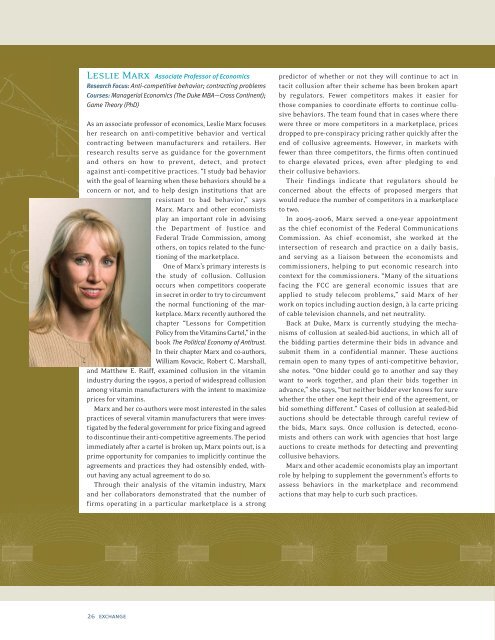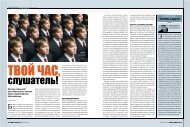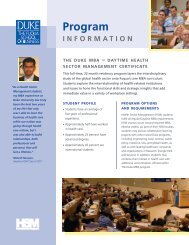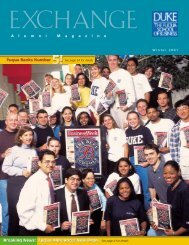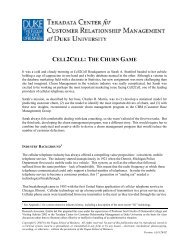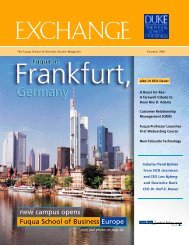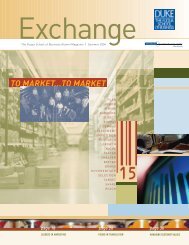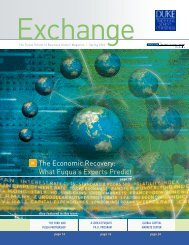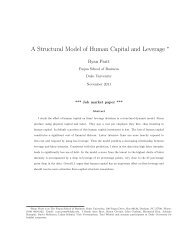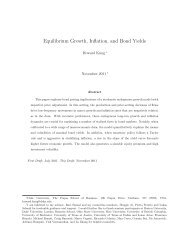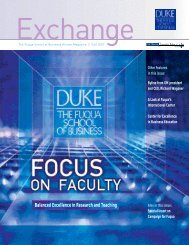Douglas T. Breeden - Duke University's Fuqua School of Business
Douglas T. Breeden - Duke University's Fuqua School of Business
Douglas T. Breeden - Duke University's Fuqua School of Business
Create successful ePaper yourself
Turn your PDF publications into a flip-book with our unique Google optimized e-Paper software.
Leslie Marx Associate Pr<strong>of</strong>essor <strong>of</strong> Economics<br />
Research Focus: Anti-competitive behavior; contracting problems<br />
Courses: Managerial Economics (The <strong>Duke</strong> MBA—Cross Continent);<br />
Game Theory (PhD)<br />
As an associate pr<strong>of</strong>essor <strong>of</strong> economics, Leslie Marx focuses<br />
her research on anti-competitive behavior and vertical<br />
contracting between manufacturers and retailers. Her<br />
research results serve as guidance for the government<br />
and others on how to prevent, detect, and protect<br />
against anti-competitive practices. “I study bad behavior<br />
with the goal <strong>of</strong> learning when these behaviors should be a<br />
concern or not, and to help design institutions that are<br />
resistant to bad behavior,” says<br />
Marx. Marx and other economists<br />
play an important role in advising<br />
the Department <strong>of</strong> Justice and<br />
Federal Trade Commission, among<br />
others, on topics related to the functioning<br />
<strong>of</strong> the marketplace.<br />
One <strong>of</strong> Marx’s primary interests is<br />
the study <strong>of</strong> collusion. Collusion<br />
occurs when competitors cooperate<br />
in secret in order to try to circumvent<br />
the normal functioning <strong>of</strong> the marketplace.<br />
Marx recently authored the<br />
chapter “Lessons for Competition<br />
Policy from the Vitamins Cartel,” in the<br />
book The Political Economy <strong>of</strong> Antitrust.<br />
In their chapter Marx and co-authors,<br />
William Kovacic, Robert C. Marshall,<br />
and Matthew E. Raiff, examined collusion in the vitamin<br />
industry during the 1990s, a period <strong>of</strong> widespread collusion<br />
among vitamin manufacturers with the intent to maximize<br />
prices for vitamins.<br />
Marx and her co-authors were most interested in the sales<br />
practices <strong>of</strong> several vitamin manufacturers that were investigated<br />
by the federal government for price fixing and agreed<br />
to discontinue their anti-competitive agreements. The period<br />
immediately after a cartel is broken up, Marx points out, is a<br />
prime opportunity for companies to implicitly continue the<br />
agreements and practices they had ostensibly ended, without<br />
having any actual agreement to do so.<br />
Through their analysis <strong>of</strong> the vitamin industry, Marx<br />
and her collaborators demonstrated that the number <strong>of</strong><br />
firms operating in a particular marketplace is a strong<br />
26 exchange<br />
predictor <strong>of</strong> whether or not they will continue to act in<br />
tacit collusion after their scheme has been broken apart<br />
by regulators. Fewer competitors makes it easier for<br />
those companies to coordinate efforts to continue collusive<br />
behaviors. The team found that in cases where there<br />
were three or more competitors in a marketplace, prices<br />
dropped to pre-conspiracy pricing rather quickly after the<br />
end <strong>of</strong> collusive agreements. However, in markets with<br />
fewer than three competitors, the firms <strong>of</strong>ten continued<br />
to charge elevated prices, even after pledging to end<br />
their collusive behaviors.<br />
Their findings indicate that regulators should be<br />
concerned about the effects <strong>of</strong> proposed mergers that<br />
would reduce the number <strong>of</strong> competitors in a marketplace<br />
to two.<br />
In 2005–2006, Marx served a one-year appointment<br />
as the chief economist <strong>of</strong> the Federal Communications<br />
Commission. As chief economist, she worked at the<br />
intersection <strong>of</strong> research and practice on a daily basis,<br />
and serving as a liaison between the economists and<br />
commissioners, helping to put economic research into<br />
context for the commissioners. “Many <strong>of</strong> the situations<br />
facing the FCC are general economic issues that are<br />
applied to study telecom problems,” said Marx <strong>of</strong> her<br />
work on topics including auction design, à la carte pricing<br />
<strong>of</strong> cable television channels, and net neutrality.<br />
Back at <strong>Duke</strong>, Marx is currently studying the mechanisms<br />
<strong>of</strong> collusion at sealed-bid auctions, in which all <strong>of</strong><br />
the bidding parties determine their bids in advance and<br />
submit them in a confidential manner. These auctions<br />
remain open to many types <strong>of</strong> anti-competitive behavior,<br />
she notes. “One bidder could go to another and say they<br />
want to work together, and plan their bids together in<br />
advance,” she says, “but neither bidder ever knows for sure<br />
whether the other one kept their end <strong>of</strong> the agreement, or<br />
bid something different.” Cases <strong>of</strong> collusion at sealed-bid<br />
auctions should be detectable through careful review <strong>of</strong><br />
the bids, Marx says. Once collusion is detected, economists<br />
and others can work with agencies that host large<br />
auctions to create methods for detecting and preventing<br />
collusive behaviors.<br />
Marx and other academic economists play an important<br />
role by helping to supplement the government’s efforts to<br />
assess behaviors in the marketplace and recommend<br />
actions that may help to curb such practices.


